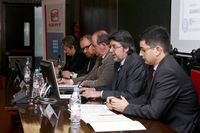Seat Promotes 'International ICT Forum In Automotive Industry'
MARTORELL, Spain – January 27, 2009: The Barcelona Industrial Engineering Technical School (ETSEIB) is today the venue for the first edition of the ‘International Forum of ICT in the Automotive Industry’ (FITCA’09) organised jointly by the SEAT-sponsored Chair and the Polytechnic University of Catalonia (UPC) amongst others. The event provides a space for science and technology to disseminate and discuss the latest developments in Information and Communication Technology (ICT) as applied to the automotive sector, road infrastructures as well as active and passive safety.
At this event several conferences were given by top-class specialists from companies such as Telefónica R&D, FICOSA; T-Systems, AT4 Wireless, GMV and SEAT’s Technical Centre. Other participants were the University of Alcalá de Henares, the ETSEIB itself and the Valencia Biomechanical Institute.
The official opening was attended by Jordi Gené, a SEAT Sport driver, winner of the World Touring Car Championship (WTCC), who gave a talk about the application of ICT to motor competition.
Additionally, Juan Manuel Marco, manager of electrical and electronic development at SEAT’s Technical Centre, highlighted the importance of ICT in the automotive industry today and tomorrow, as well as the need for real-time information on road conditions, road services, and its impact on good and effective driving.
‘2nd Car Design Day – SEAT-Elisava projects’
But this is not the only example of SEAT’s engagement with the academic world. In the afternoon SEAT participated in the ‘2nd Car Design Day – SEAT-Elisava projects’, held at the Elisava Design School.
The opening session was attended by Aleix Carrió (Chairman of the Elisava Foundation Trustees’ Board), Xavier Costa (Director of the Elisava Design School), as well as Carmen Tamayo, Manager of Personnel Development of SEAT.
The day began with the presentation of three projects by students from the centre, tutored by SEAT, which might well become designs of future models of the brand: a futurist 4x4, the coupe of the 21st century, and a new concept for a single-seater.
Later, students were given first-hand knowledge of how a new vehicle evolves, from the initial idea to the go-ahead, as well as the techniques and processes which follow other in SEAT in car design.
Design is precisely one of SEAT’s distinguishing features, and one of the most visible marks of the Spanish brand. Hence SEAT’s collaboration with Elisava, the first design school created in Spain, thus supporting future designers both in logistics and training.



